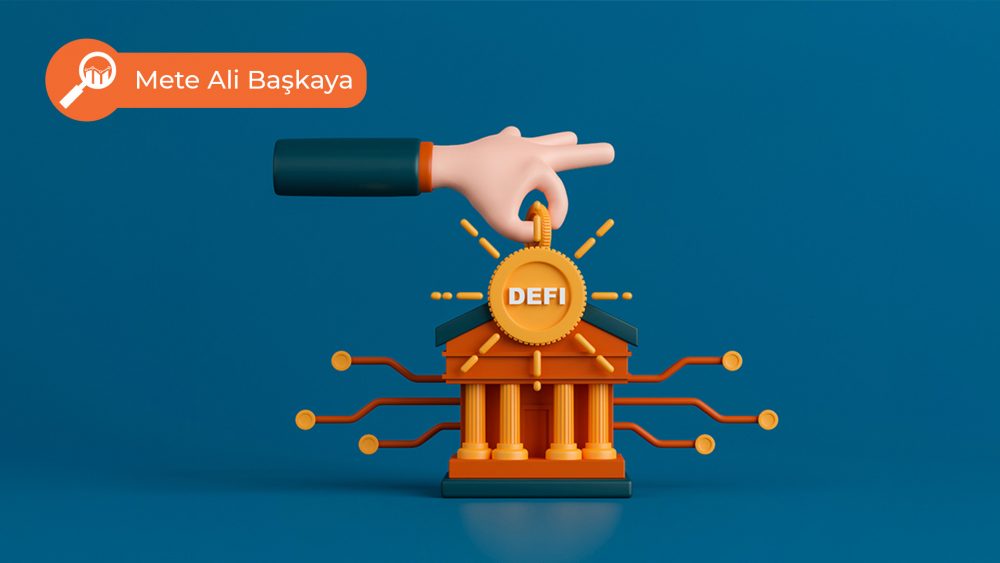Decentralized finance (DeFi) is a new financial technology based on secure distributed ledgers like cryptocurrencies. All banks and banking systems owned by countries or known as private affiliates are managed by the rules determined by the state rule makers. DeFi, on the other hand, stands against these centralized financial systems and ensures that each individual is empowered by working with peer-to-peer digital assets.
How does Decentralized Finance work? What advantages does it offer individuals?
Decentralized Finance uses Blockchain technology just like cryptocurrencies use. DApps are used to make transactions, blockchain works thanks to dApps.
On the blockchain, transactions are recorded in blocks, then validated by other users. If these validators agree on a transaction, the block is closed and encrypted; Another block is created containing information about the previous block.
Implementation of decentralized finance
Thanks to the principle of eliminating intermediaries, which is the most important goal of decentralized finance; natural and legal persons can easily implement peer-to-peer transactions. Thanks to this (peer to peer) networks, DeFi uses it in security protocols, connectivity, software and hardware developments. To put it briefly, the decentralized financial process is one of the most important elements for the development of technology.
Advantages and disadvantages of decentralized finance
In addition to its capacity to do business globally, it offers the opportunity to transfer capital regardless of time. The high security it provides to individuals, speed, and high income from the investor profile are among the biggest advantages.
When viewed as a disadvantage; The fact that dApps are not yet understandable can reduce the capacity of individuals to use them in this world where blockchain literacy is low. We hear a lot about road accidents such as fraud and fraud in the development processes of blockchain literacy. We are confident that all of the disadvantages will be addressed by developers and ecosystem professionals.
The future place of decentralized finance
Decentralized finance is evolving day by day, the usage areas of individuals will increase in the world where blockchain literacy will develop and process management will continue in the field of finance. In today’s world, where we see that the development process continues, the fact that it has not been regulated yet, the infrastructure problems, which in a standard infrastructure process, are suffering from high technology production. As can be expected, the fact that regulatory protocols are still open to hacks and attacks, and that lawmakers should be open to innovation, puts on the table the fact that there will be legal differences and they will keep up with this change.
Why are banks struggling to accept cryptocurrencies and decentralized finance?
Decentralized finance is a structure that opposes the existing banking system and puts individual people at the forefront of continuing their trade. The concept of decentralized finance eliminates the fees that banks and other financial companies charge for using their services, and peer-to-peer allows for new one-on-one transactions. invites people to use this innovation.
Cryptocurrencies and decentralized finance; His efforts to change the financial system around the world are followed with interest by the whole world. Especially in the banking sector, the process is prolonged due to hesitations about the use of cryptocurrencies.
What are these hesitations?
Volatility, i.e. drastic movements up and down due to the lack of regulation, is one of the most important hesitations about the use of crypto money in banking. For example, companies such as Amazon and Tesla, which are listed on the stock market, have kept their reserves and have not made new purchases. At the point of payment acceptance, they are more abstaining compared to previous periods.
The most important task of central banks is to provide economic policies within the country and to eliminate situations that will create insecurity. Cryptocurrencies are not directly affected by the interest rates of a particular country, which causes many factors to influence their value. If a central bank cannot control the value of the currency its people use, it can no longer control inflation or the safety, stability and soundness of economic and financial systems. .
The regulation and legal status of cryptocurrencies is one of the important hesitations for banks. Consideration is given to the anonymous nature of cryptocurrencies and the possibility of their use for money laundering and other illegal activities.
As we mentioned in the decentralized finance section, since it is a new technology and the literacy level has not reached the desired level yet, they do not want to take the technological risks, and this creates the instinct to protect their customers in this process. It may not be found to be significant in terms of investment, in which the cyber security criterion is also taken into consideration.
As a result, the main reasons banks refuse to accept cryptocurrencies include volatility, central bank control, regulatory and legal issues, technological challenges and security concerns, and customer protection. These factors appear to be significant barriers to the general acceptance of cryptocurrencies.
In countries that are technologically secure and in terms of risk structure, the adoption of cryptocurrencies in banks has started, although not very often, and it is seen that we are approaching step by step to the period when the process is carefully scrutinized by other financial institutions and innovations are introduced to people in front of the whole world.





